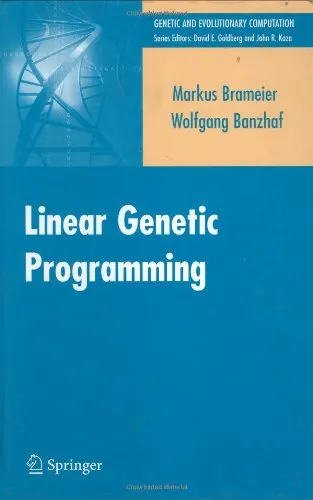Linear Genetic Programming
4.5
Reviews from our users

You Can Ask your questions from this book's AI after Login
Each download or ask from book AI costs 2 points. To earn more free points, please visit the Points Guide Page and complete some valuable actions.Related Refrences:
Welcome to the introduction to Linear Genetic Programming, a transformative book written by Markus F. Brameier and Wolfgang Banzhaf. This text provides a comprehensive and cutting-edge examination of Linear Genetic Programming (LGP), a promising variant of genetic programming. The book delves deep into the foundation, methodology, and applications of LGP, making it an indispensable guide for researchers, practitioners, and enthusiasts in the field of evolutionary computation.
Detailed Summary of the Book
The book begins by laying a robust theoretical foundation for understanding LGP in the broader context of genetic programming. LGP distinguishes itself by representing programs as sequences of instructions, operating on registers, in contrast to traditional tree-based genetic programming. This linear representation offers computational efficiency, simplicity, and flexibility, making it particularly suitable for code optimization, symbolic regression, and machine learning tasks.
The authors guide readers through the entire lifecycle of evolutionary computation, from program initialization and fitness evaluation to genetic operators and population dynamics. A significant portion of the text is devoted to exploring mutation, crossover, and selection mechanisms tailored for LGP. Additionally, the book emphasizes the importance of neutral variation and survives selection, essential concepts in understanding how evolutionary processes foster diversity and improve solutions over time.
Real-world applications of LGP are also given ample attention. Through practical examples, experiments, and case studies, the book showcases how LGP can be utilized to solve complex real-world problems in engineering, science, and data analysis. The authors strike a balanced tone between theoretical rigor and practical relevance, ensuring that learners from diverse backgrounds can appreciate the depth and utility of LGP.
Finally, the book compares LGP with other evolutionary algorithms, highlighting its unique strengths and the conditions under which it can outperform alternate approaches. This systematic and holistic treatment of the topic sets Linear Genetic Programming apart as a definitive resource in the domain of genetic programming.
Key Takeaways
- Linear Genetic Programming (LGP) uses a sequential representation of programs, making it efficient and highly interpretable compared to tree-based methods.
- LGP is not only computationally effective but also better suited for hardware-based implementation, due to its similarity to machine-level instruction execution.
- The book provides a comprehensive analysis of neutral evolution, crossover mechanics, and mutation techniques specific to LGP, giving readers tools to optimize their implementations.
- By combining theory with experiments, this book serves as both an academic resource and a practical guide for applying genetic programming to real-world tasks.
- Readers will also appreciate the comparison of LGP's performance to other evolutionary methods, which provides clarity on where and why LGP excels.
Famous Quotes from the Book
"In linear genetic programming, survival is not about the fittest individual alone but the interplay of diversity, neutral mutations, and adaptation over generations."
"The simplicity and linear structure of LGP lead to surprisingly complex solutions, showcasing the power of evolutionary design."
Why This Book Matters
As advancements in machine learning and artificial intelligence drive innovation across industries, evolutionary computation methods such as genetic programming have gained attention for their ability to derive solutions that are not explicitly programmed. Linear Genetic Programming, in particular, stands out for its practical capabilities in computational problem-solving and code generation. By reading this book, you'll gain a structured understanding of how LGP can address challenges where traditional algorithmic approaches fall short.
The text also bridges the gap between fundamental research and applied science, equipping readers with the tools to push the boundaries of evolutionary computation. With its methodical presentation and insightful commentary, Linear Genetic Programming not only educates but also inspires researchers to innovate in this exciting field.
This book matters because it empowers readers to grasp the nuances of LGP, apply it effectively, and appreciate its broader implications in the evolution of intelligent systems.
Free Direct Download
You Can Download this book after Login
Accessing books through legal platforms and public libraries not only supports the rights of authors and publishers but also contributes to the sustainability of reading culture. Before downloading, please take a moment to consider these options.
Find this book on other platforms:
WorldCat helps you find books in libraries worldwide.
See ratings, reviews, and discussions on Goodreads.
Find and buy rare or used books on AbeBooks.
1252
بازدید4.5
امتیاز50
نظر98%
رضایتReviews:
4.5
Based on 0 users review
"کیفیت چاپ عالی بود، خیلی راضیام"
Questions & Answers
Ask questions about this book or help others by answering
No questions yet. Be the first to ask!



